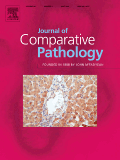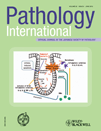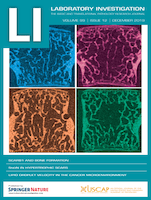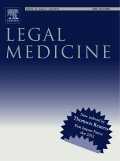
Rechtsmedizin
Scope & Guideline
Enhancing Understanding in Forensic Disciplines
Introduction
Aims and Scopes
- Forensic Pathology and Autopsy:
Exploration of methodologies in forensic autopsies, the determination of cause and manner of death, and the implications for legal proceedings. - Legal Medicine and Ethics:
Examination of the legal aspects of medical practice, including malpractice, consent, and ethical dilemmas encountered in the forensic context. - Violence and Injury Analysis:
Analysis of injuries and deaths related to violence, including domestic violence, child abuse, and occupational hazards, with implications for prevention and legal action. - Toxicology and Substance Abuse:
Research on the effects of drugs and alcohol in forensic contexts, including their role in accidents, suicides, and homicides. - Interdisciplinary Approaches:
Integration of various disciplines, including psychology, sociology, and public health, to address complex forensic issues and enhance interdisciplinary collaboration. - Training and Education in Forensic Medicine:
Focus on the education and training of professionals in forensic medicine, including workshops, seminars, and curriculum development.
Trending and Emerging
- Mental Health and Forensic Medicine:
Increasingly, the intersection of mental health issues and forensic analysis is being explored, highlighting the importance of psychological evaluations in legal contexts. - Assisted Suicide and Euthanasia:
A significant rise in discussions and analyses regarding assisted suicide and euthanasia reflects ongoing societal debates and legal challenges surrounding these sensitive topics. - Impact of COVID-19 on Forensic Practices:
Research related to the implications of the COVID-19 pandemic on forensic medicine, including autopsy findings and changes in protocols, has emerged as a crucial area of focus. - Child Protection and Forensic Investigations:
There is a growing emphasis on forensic investigations related to child protection, indicating an increased awareness of child abuse and the need for legal frameworks to safeguard vulnerable populations. - Technological Innovations in Forensic Analysis:
The incorporation of advanced technologies, such as DNA analysis and imaging techniques, is becoming a prominent theme, showcasing the journal's commitment to staying at the forefront of forensic science.
Declining or Waning
- Historical Perspectives on Forensic Medicine:
There has been a noticeable decrease in papers focusing exclusively on historical analyses of forensic practices, indicating a potential shift towards contemporary issues and technological advancements. - Traditional Forensic Techniques:
As forensic science evolves, traditional techniques may be less frequently discussed, with a greater emphasis on modern methods such as genetic analysis and imaging techniques. - General Public Health Topics:
The journal has seen fewer articles addressing broad public health issues, suggesting a more specialized focus on legal and forensic implications rather than general health discussions. - International Collaboration:
There has been a decline in studies focusing on international forensic practices and collaborations, possibly due to increased emphasis on national standards and protocols.
Similar Journals

JOURNAL OF COMPARATIVE PATHOLOGY
Enhancing Diagnostic Accuracy Through Comparative StudiesJOURNAL OF COMPARATIVE PATHOLOGY, published by Elsevier Science Ltd, stands as a significant publication within the fields of pathology and forensic medicine, as well as veterinary studies. With an ISSN of 0021-9975 and an E-ISSN of 1532-3129, this journal has been disseminating critical research since 1950, contributing to the advancement of knowledge through its focus on comparative pathology. The journal's reputable standing is underscored by its Q3 classification in Pathology and Forensic Medicine and Q2 in Veterinary (miscellaneous) for 2023, reflecting its vital role in shaping contemporary discourse in these domains. The Scopus ranks further solidify its presence, placing it at the 51st percentile in general veterinary sciences and the 32nd percentile in pathology—a testament to the quality and relevance of the contributions it publishes. Although it operates under a subscription model, the journal remains accessible to researchers and practitioners who aim to deepen their understanding of pathological phenomena across species, enhance diagnostic accuracy, and improve clinical practices. With a steadfast commitment to rigorous peer review and a global readership, the JOURNAL OF COMPARATIVE PATHOLOGY is an essential resource for those engaged in research and professional practice, fostering collaborations and innovations that bridge complementary areas of study.

PATHOLOGY INTERNATIONAL
Uncovering Breakthroughs in Medical Science Since 1951PATHOLOGY INTERNATIONAL, published by WILEY, stands as a distinguished journal in the field of pathology and forensic medicine, serving as an essential resource for researchers, clinicians, and students alike. With its ISSN 1320-5463 and E-ISSN 1440-1827, PATHOLOGY INTERNATIONAL has established itself since its inception in 1951, navigating through an evolving landscape in medical science with insights and breakthroughs up to 2024. It holds a commendable Q2 ranking in both the Medicine (miscellaneous) and Pathology and Forensic Medicine categories, indicating its robust influence and quality within these fields, as evidenced by its placement in the 70th percentile of Scopus rankings. While currently not an open-access journal, it provides access options that ensure valuable research remains available to the academic community. PATHOLOGY INTERNATIONAL commits to advancing the discipline through pioneering research articles, comprehensive reviews, and expert opinions that push the boundaries of understanding in pathology, thereby supporting the enhancement of diagnostic and therapeutic practices.

LABORATORY INVESTIGATION
Elevating Standards in Laboratory InvestigationLaboratory Investigation is a premier academic journal published by Elsevier Science Inc, specializing in the fields of Pathology, Forensic Medicine, Cell Biology, and Molecular Biology. With its ISSN 0023-6837 and E-ISSN 1530-0307, this journal has been a significant contributor to scientific discourse since its inception in 1952, converging into its current form by 2024. It holds an impressive standing in its respective fields, featuring a 2023 Journal Rank of Q2 in both Cell Biology and Molecular Biology, and an elite Q1 ranking in Pathology and Forensic Medicine, reflecting its influence and quality of research, as seen in its Scopus ranks—17th out of 208 in Pathology and Forensic Medicine. Although it does not offer Open Access options, the journal remains a vital resource for researchers, professionals, and students who seek to disseminate and engage with high-caliber research findings. The importance of Laboratory Investigation is underscored by its commitment to advancing the understanding of laboratory and translational medicine, paving the way for innovations that enhance clinical practices.

AJSP-Reviews and Reports
Fostering Scholarly Dialogue in MedicineAJSP-Reviews and Reports is a peer-reviewed journal dedicated to the advancement of knowledge within the field of pathology and forensic medicine. Published by the renowned Lippincott Williams & Wilkins, this journal plays a vital role in disseminating insightful reviews and reports that contribute to the understanding and application of diagnostic practices and forensic investigations. While currently listed in the fourth quartile (Q4) within its category according to the 2023 metrics, the journal is committed to enhancing its impact and fostering scholarly dialogue among researchers, professionals, and students in the medical community. Despite challenges in Scopus rankings, it provides a platform for significant discourse and innovation in pathology. Operating from the United Kingdom, AJSP-Reviews and Reports is positioned to bridge gaps in knowledge and inspire future research developments. Readers can access valuable findings without open access barriers, allowing for efficient information sharing within the medical field.

Legal Medicine
Navigating the complexities of law and medicine.Legal Medicine, ISSN 1344-6223, published by ELSEVIER IRELAND LTD, stands as a pivotal academic journal within the realms of forensic medicine and legal ethics. Operating from the Netherlands, this journal has established a strong reputation among researchers and practitioners since its inception in 1999, with the goal of advancing knowledge in the intersection of legal and medical disciplines. With a commendable Q2 categorization in both Issues, Ethics and Legal Aspects and Pathology and Forensic Medicine, it ranks among the noteworthy publications in these fields, placing it in the 51st percentile for Pathology and Forensic Medicine and 51st for Nursing-related ethical issues. The journal not only serves as a repository for innovative research and practical case studies but also emphasizes the importance of ethical considerations in medical legal scenarios. Although it does not offer Open Access options, it remains a crucial resource for professionals, researchers, and students seeking to stay informed about the latest developments that shape legal medicine. Access to its contents promises to enhance understanding and inspire advancements in both forensic science and the ethical frameworks surrounding them.

Pathologie
Exploring Innovative Insights in Pathological ResearchPathologie is a distinguished academic journal published by Springer Heidelberg, dedicated to advancing the field of pathology and forensic medicine. With an ISSN of 2731-7188 and an E-ISSN of 2731-7196, this journal serves as a vital platform for researchers, professionals, and students to disseminate innovative findings and insights. Currently ranked in the Q3 category of pathology and forensic medicine according to the 2023 metrics, Pathologie reflects a commitment to quality and relevance in a dynamic research landscape. Despite its relatively recent establishment from 2022, the journal is gaining traction with a Scopus rank of 139 out of 208 in its category, positioning itself as an emerging resource within the academic community. While it operates under a subscription model, the importance of the journal lies in its objective to facilitate the exploration of diverse pathological processes and enhance forensic methodologies, ultimately improving clinical outcomes and investigative practices. As it continues to grow, Pathologie stands poised to impact the pathology domain significantly.

Forensic Science Medicine and Pathology
Innovating the Future of Pathology in Forensic ScienceForensic Science Medicine and Pathology is an esteemed journal published by HUMANA PRESS INC, focusing on the critical intersections of forensic science, medicine, and pathology. Since its inception in 2005, this journal has provided a vital platform for researchers and practitioners to share innovative studies and findings that enhance our understanding of forensic methodologies and their applications in medical contexts. With an impact factor reflecting its significant contribution to the field, it holds a Q3 ranking in Medicine (miscellaneous) and a commendable Q2 ranking in Pathology and Forensic Medicine as of 2023, indicating its growing influence among scholarly circles. The journal is indexed in Scopus, ranking #76 out of 208 in the Medicine – Pathology and Forensic Medicine category, placing it in the 63rd percentile. Despite it not being an Open Access journal, it remains a crucial resource for professionals, students, and researchers dedicated to forensic sciences and related disciplines. For those seeking cutting-edge research and advancements in forensic methodologies, this journal is an essential addition to any academic repertoire.

Forensic Toxicology
Exploring the Intersection of Toxicology and Forensic MedicineForensic Toxicology is a premier journal published by Springer, renowned for delivering cutting-edge research in the realms of toxicology, biochemistry, and forensic medicine. With an ISSN of 1860-8965 and an E-ISSN of 1860-8973, this journal has established itself as a significant resource for professionals, researchers, and students engaged in the analysis of toxic substances within a forensic context. Its impressive impact factor and ranking reveal its influential presence in the field, particularly as it is categorized in Q1 for Pathology and Forensic Medicine and Q2 for Biochemistry (Medical) and Toxicology. Featured articles span a wide array of topics, facilitating interdisciplinary collaboration and advancing scientific knowledge. While currently not an open-access journal, it remains accessible through institutional subscriptions. With a convergence span from 2006 to 2024, Forensic Toxicology is committed to publishing high-quality research that enhances the understanding of toxicological phenomena and their implications in forensic investigations, reinforcing its role as an indispensable resource in the scientific community.

INTERNATIONAL JOURNAL OF LEGAL MEDICINE
Pioneering Research in Forensic Science and Legal MedicineINTERNATIONAL JOURNAL OF LEGAL MEDICINE, published by SPRINGER, stands at the forefront of research in the fields of legal medicine, pathology, and forensic science. With an ISSN of 0937-9827 and an E-ISSN of 1437-1596, this esteemed journal has successfully maintained its reputation as a leading publication since its inception in 1990, providing a platform for the dissemination of cutting-edge research and case studies. The journal is recognized as a Q1 category publication in the 2023 Pathology and Forensic Medicine quartiles, ranking #44 out of 208 in its category on Scopus, reflecting its significant contribution to the academic community—demonstrated by its impressive 79th percentile. While the journal operates under a traditional subscription model, it is committed to enhancing access to critical insights in legal medicine. The INTERNATIONAL JOURNAL OF LEGAL MEDICINE invites researchers, professionals, and students to explore its manuscripts that shed light on the intersection of law and medicine, thus pushing the boundaries of what is known in these vital fields.

International Journal of Medical Toxicology and Forensic Medicine
Exploring Critical Issues in Toxicology and Forensic ScienceInternational Journal of Medical Toxicology and Forensic Medicine, published by Shaheed Beheshti Medical University of Medical Sciences & Health Services, is a pioneering platform dedicated to advancing knowledge within the critical fields of toxicology and forensic medicine. Established as an Open Access journal since 2011, it ensures wide dissemination of research findings, catering to a global audience of researchers, healthcare professionals, and students. With an ISSN of 2251-8762 and an E-ISSN of 2251-8770, the journal covers a diverse range of topics relevant to the medical community, albeit being categorized as Q4 in both Pathology and Forensic Medicine and Toxicology in 2023, indicating emerging significance in these disciplines. Geographically based in Tehran, Iran, it aspires to bridge gaps in scientific research and practice, particularly in regions where such expertise is critical. The journal welcomes submissions that investigate pressing issues in medical toxicology and forensic science, fostering an interdisciplinary dialogue essential for innovative solutions and improved public health outcomes.